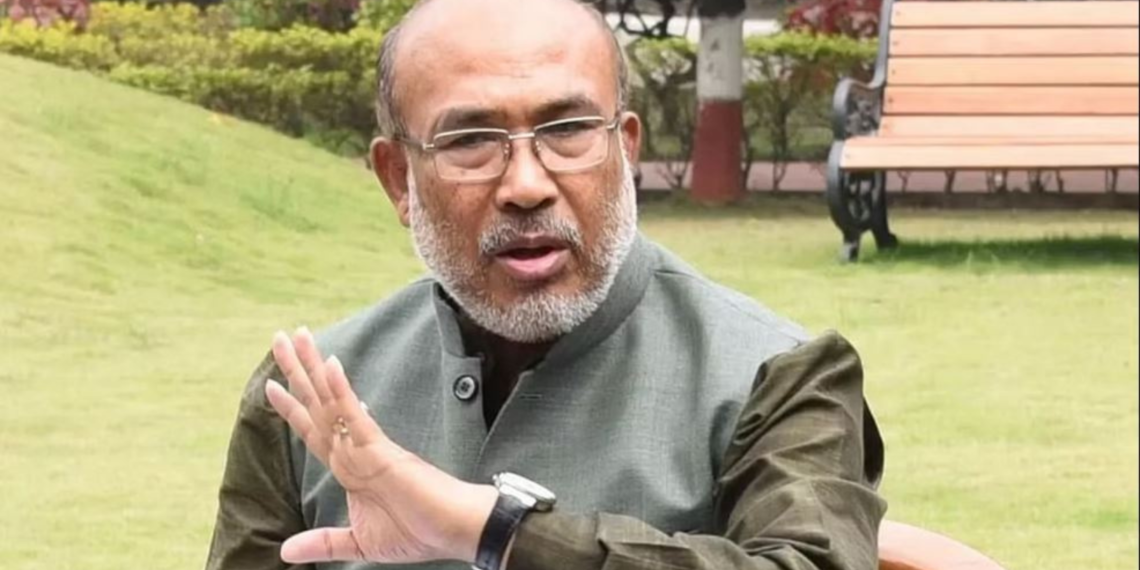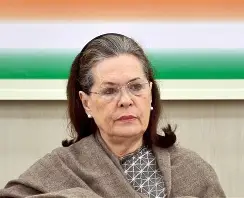With the Supreme Court set to review forensic reports on leaked audio tapes on May 5, Manipur’s political future hangs in the balance. The case against former CM N. Biren Singh, concerning his alleged role in fueling ethnic strife, poses a significant challenge for the BJP and underscores the complexities of forensic evidence.”
BY Navin Upadhyay
The upcoming Supreme Court hearing on May 5, 2025, in the case of Kuki Organization for Human Rights Trust vs. Union of India and Anr. (W.P.(C) No. 702/2024) marks a critical juncture in Manipur’s ongoing ethnic conflict and the political trajectory of former Chief Minister N. Biren Singh. The case, centered on leaked audio tapes allegedly implicating Singh in fueling ethnic violence between the Meitei and Kuki communities, has far-reaching implications for Manipur’s stability, communal harmony, and Singh’s political future.
The ethnic violence in Manipur, which erupted on May 3, 2023, following a ‘Tribal Solidarity March’ protesting the Manipur High Court’s order on the Meitei community’s demand for Scheduled Tribe status, has claimed over 260 lives and displaced thousands. The conflict between the Imphal valley-based Meitei and hills-based Kuki communities has deepened mistrust and polarized the state. Amid this turmoil, the Kuki Organization for Human Rights Trust (KOHUR) filed a petition in the Supreme Court, alleging that leaked audio tapes reveal Singh’s complicity in inciting and orchestrating violence against the Kuki community.
The tapes, purportedly recorded during a closed-door meeting, allegedly capture Singh admitting to allowing Meitei groups to loot state armories and ensuring their protection from arrest. KOHUR, represented by advocate Prashant Bhushan, has demanded a court-monitored Special Investigation Team (SIT) probe into Singh’s role, citing the tapes as “clear and strong prima facie evidence” of the involvement of the state’s highest functionary. The Manipur government, however, has dismissed the tapes as “fake” and part of a “malicious campaign” to derail peace efforts, with the state police investigating their origins through its cybercrime division.
The Supreme Court has sought a forensic report from the Central Forensic Science Laboratory (CFSL) to verify the tapes’ authenticity, with the report to be submitted in a sealed cover. A private forensic lab, Truth Labs, commissioned by KOHUR, has already certified a 93% probability that the voice in the tapes matches Singh’s, based on comparisons with his public speeches. The court’s next hearing on May 5, 2025, is expected to review the CFSL report and determine the course of action, including whether the case should be heard by the Supreme Court or transferred to the Manipur High Court.
The next hearing on N Biren Singh Audio Tap Case in the Supreme Court is listed on 5th May, 2025.
Case No. W.P.(C) NO. 702/2024 – KUKI ORGANIZATION FOR HUM… Vs. UNION OF INDIA AND ANR. is listed on 05-05-25 in Court No. 1 as Item No. 26 subject to order for the day. – SUPREME…— H S Benjamin Mate (@BenjaminMate1) May 1, 2025
Significance of the Case
The N. Biren Singh audio tape case is a watershed moment for Manipur and India’s broader political and judicial landscape. Its significance lies in several key areas:
- Accountability of State Leadership: The allegations against Singh strike at the heart of governance and accountability. If the tapes are authenticated, they could substantiate claims that the state machinery was complicit in exacerbating ethnic violence, undermining public trust in institutions. A court-monitored SIT probe, as sought by KOHUR, could set a precedent for holding high-ranking officials accountable for communal strife, reinforcing the judiciary’s role as a guardian of constitutional rights.
ALSO READ: Grief-laden Manipur Hills Observe ‘Separation Day’ Shutdown
- Impact on Manipur’s Fragile Peace: Manipur is “limping back to normalcy,” but the state remains volatile, with sporadic violence in rural areas. Validation of the tapes might intensify demands for justice among the Kuki community, potentially escalating tensions if not handled sensitively. Conversely, if the tapes are deemed fabricated, it could bolster the state’s narrative of a misinformation campaign, but risks alienating Kukis further if perceived as a cover-up.
- Judicial Oversight in Conflict Zones: The Supreme Court’s decision to examine the tapes underscores its proactive role in addressing allegations of state complicity in conflict zones. Former CJI D.Y. Chandrachud’s assertion that the court is not “sitting in an ivory tower” reflects its commitment to constitutional duties, particularly in states like Manipur, where local mechanisms may be compromised. The court’s choice to hear the case or refer it to the High Court will also shape perceptions of judicial accessibility in sensitive cases.
- Political Ramifications for the BJP: The case poses a significant challenge for the Bharatiya Janata Party (BJP), which has backed Singh throughout the crisis. Singh’s resignation as Chief Minister on February 12, 2025, amid internal party discord and public pressure, was a direct consequence of the mounting controversy surrounding the tapes. A judicial finding against him could tarnish the BJP’s image in the Northeast, where communal stability is fragile, potentially reshaping the party’s electoral prospects in Manipur and beyond.
ALSO READ: The Horror of May 3, 2023, and Way Ahead: WL. Hangshing
Biren Singh’s Political Future
- Biren Singh’s political career hangs in the balance. His resignation as Chief Minister in February 2025 was a significant blow, driven by internal BJP dynamics and public outrage over the tapes. The Supreme Court’s ruling will likely determine whether he can salvage his political relevance:
*If the Tapes Are Authenticated: A judicial validation of the tapes would likely end Singh’s political career. Legal consequences, including potential prosecution, could follow, and the BJP would distance itself to mitigate electoral damage. His legacy as a leader who deepened ethnic divisions would overshadow his earlier achievements, such as infrastructure development and anti-drug campaigns.
- If the Tapes Are Deemed Fake: A finding that the tapes are fabricated could partially restore Singh’s reputation, allowing him to portray himself as a victim of a targeted campaign. However, lingering distrust among the Kuki community and within the BJP’s ranks might limit his ability to reclaim a leadership role. His political comeback would depend on his ability to navigate Manipur’s fractured communal landscape and rebuild alliances.
Accuracy of Forensic Labs in Audio Tape Analysis
The reliability of forensic audio analysis is a critical issue in this case. Forensic audio analysis involves techniques such as auditory comparison, spectrographic analysis, and statistical modeling to determine the authenticity of recordings and identify speakers. However, its accuracy depends on several factors.
- Truth Labs’ Findings: Truth Labs, a private forensic lab in Hyderabad, reported a 93% probability that the voice in the leaked tapes matches Singh’s, based on comparisons with his public speeches. The lab’s methodology included auditory, spectrographic, and likelihood analyses, and its reputation is bolstered by its use by courts, the CBI, and other agencies. However, Solicitor General Tushar Mehta has questioned its credibility, noting that it is a private entity and potentially less reliable than government labs. The 93% match, while compelling, is not conclusive, as environmental factors, recording quality, and sample size can introduce errors.
- CFSL’s Role: The CFSL, a government-run lab, is tasked with providing an independent analysis for the Supreme Court. Government labs are often perceived as more standardized, but their impartiality can be questioned in politically sensitive cases, especially when the state is a party. The CFSL’s report, expected to be reviewed on May 5, will carry significant weight, but discrepancies with Truth Labs’ findings could spark debate over methodology and bias.
ALSO READ: Air India Flight Diverted to Abu Dhabi After Missile Attack
- General Accuracy of Audio Forensics: Forensic audio analysis typically achieves high accuracy under ideal conditions—clear recordings, sufficient voice samples, and advanced software. Studies suggest that spectrographic voice identification can be 80-95% accurate, but false positives or negatives can occur due to background noise, voice modulation, or tampering. Courts often treat such evidence as corroborative rather than definitive, requiring supporting evidence like witness testimony or metadata analysis. In this case, the tapes’ origin (recorded by a whistleblower) and potential editing (e.g., adding subtitles) complicate the analysis.
ALSO READ: BJP’s Silence Echoes Loud on Manipur’s Painful Anniversary
The N. Biren Singh audio tape case is a defining moment for Manipur, with the potential to reshape its social fabric, governance, and political dynamics. The Supreme Court’s hearing on May 5, 2025, will not only determine the authenticity of the tapes but also signal the judiciary’s approach to allegations of state complicity in ethnic violence. For Manipur, the case offers a chance for justice and reconciliation, but risks exacerbating divisions if mishandled. For Singh, the verdict will decide whether he fades into political oblivion or emerges as a resilient figure. The accuracy of forensic audio analysis, while advanced, remains imperfect, and the court’s reliance on both Truth Labs and CFSL reports underscores the complexity of establishing truth in such cases. As Manipur awaits the outcome, the case serves as a stark reminder of the delicate balance between justice, stability, and truth in India’s conflict zones













